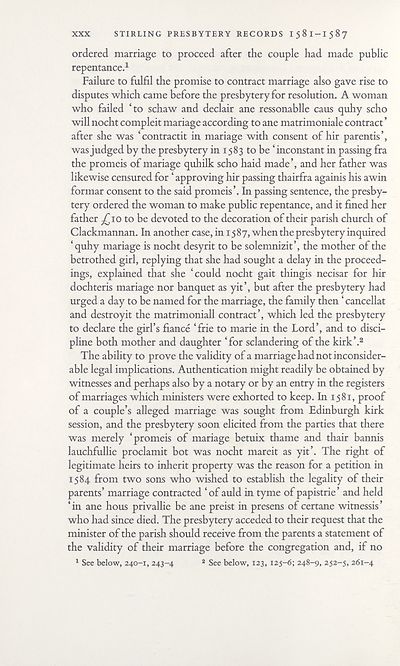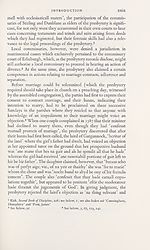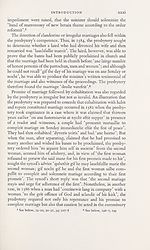Series 4 > Stirling Presbytery Records 1581-1587
(35) Page xxx
Download files
Complete book:
Individual page:
Thumbnail gallery: Grid view | List view

XXX STIRLING PRESBYTERY RECORDS I581-I587
ordered marriage to proceed after the couple had made public
repentance.1
Failure to fulfil the promise to contract marriage also gave rise to
disputes which came before the presbytery for resolution. A woman
who failed ‘to schaw and declair ane ressonablle caus quhy scho
will nocht compleit manage according to ane matrimoniale contract’
after she was ‘contractit in manage with consent of hir parentis’,
was judged by the presbytery in 1583 to be ‘inconstant in passing fra
the promeis of manage quhilk scho haid made’, and her father was
likewise censured for ‘approving hir passing thairfra againis his awin
formar consent to the said promeis’. In passing sentence, the presby¬
tery ordered the woman to make public repentance, and it fined her
father -£10 to be devoted to the decoration of their parish church of
Clackmannan. In another case, in 1587, when the presbytery inquired
‘quhy manage is nocht desyrit to be solemnizit’, the mother of the
betrothed girl, replying that she had sought a delay in the proceed¬
ings, explained that she ‘could nocht gait thingis necisar for hir
dochteris mariage nor banquet as yit’, but after the presbytery had
urged a day to be named for the marriage, the family then ‘ cancellat
and destroyit the matrimoniall contract’, which led the presbytery
to declare the girl’s fiance ‘frie to marie in the Lord’, and to disci¬
pline both mother and daughter ‘for sclandering of the kirk’.2
The ability to prove the validity of a marriage had not inconsider¬
able legal implications. Authentication might readily be obtained by
witnesses and perhaps also by a notary or by an entry in the registers
of marriages which ministers were exhorted to keep. In 1581, proof
of a couple’s alleged marriage was sought from Edinburgh kirk
session, and the presbytery soon elicited from the parties that there
was merely ‘promeis of mariage betuix thame and thair bannis
lauchfullie proclamit hot was nocht mareit as yit’. The right of
legitimate heirs to inherit property was the reason for a petition in
1584 from two sons who wished to establish the legality of their
parents’ marriage contracted ‘of auld in tyme of papistrie’ and held
‘in ane hous privallie be ane preist in presens of certane witnessis’
who had since died. The presbytery acceded to their request that the
minister of the parish should receive from the parents a statement of
the validity of their marriage before the congregation and, if no
1 See below, 240-1, 243-4 2 See below, 123, 125-6; 248-9, 252-5, 261-4
ordered marriage to proceed after the couple had made public
repentance.1
Failure to fulfil the promise to contract marriage also gave rise to
disputes which came before the presbytery for resolution. A woman
who failed ‘to schaw and declair ane ressonablle caus quhy scho
will nocht compleit manage according to ane matrimoniale contract’
after she was ‘contractit in manage with consent of hir parentis’,
was judged by the presbytery in 1583 to be ‘inconstant in passing fra
the promeis of manage quhilk scho haid made’, and her father was
likewise censured for ‘approving hir passing thairfra againis his awin
formar consent to the said promeis’. In passing sentence, the presby¬
tery ordered the woman to make public repentance, and it fined her
father -£10 to be devoted to the decoration of their parish church of
Clackmannan. In another case, in 1587, when the presbytery inquired
‘quhy manage is nocht desyrit to be solemnizit’, the mother of the
betrothed girl, replying that she had sought a delay in the proceed¬
ings, explained that she ‘could nocht gait thingis necisar for hir
dochteris mariage nor banquet as yit’, but after the presbytery had
urged a day to be named for the marriage, the family then ‘ cancellat
and destroyit the matrimoniall contract’, which led the presbytery
to declare the girl’s fiance ‘frie to marie in the Lord’, and to disci¬
pline both mother and daughter ‘for sclandering of the kirk’.2
The ability to prove the validity of a marriage had not inconsider¬
able legal implications. Authentication might readily be obtained by
witnesses and perhaps also by a notary or by an entry in the registers
of marriages which ministers were exhorted to keep. In 1581, proof
of a couple’s alleged marriage was sought from Edinburgh kirk
session, and the presbytery soon elicited from the parties that there
was merely ‘promeis of mariage betuix thame and thair bannis
lauchfullie proclamit hot was nocht mareit as yit’. The right of
legitimate heirs to inherit property was the reason for a petition in
1584 from two sons who wished to establish the legality of their
parents’ marriage contracted ‘of auld in tyme of papistrie’ and held
‘in ane hous privallie be ane preist in presens of certane witnessis’
who had since died. The presbytery acceded to their request that the
minister of the parish should receive from the parents a statement of
the validity of their marriage before the congregation and, if no
1 See below, 240-1, 243-4 2 See below, 123, 125-6; 248-9, 252-5, 261-4
Set display mode to:
![]() Universal Viewer |
Universal Viewer | ![]() Mirador |
Large image | Transcription
Mirador |
Large image | Transcription
Images and transcriptions on this page, including medium image downloads, may be used under the Creative Commons Attribution 4.0 International Licence unless otherwise stated. ![]()
| Scottish History Society volumes > Series 4 > Stirling Presbytery Records 1581-1587 > (35) Page xxx |
|---|
| Permanent URL | https://digital.nls.uk/126646575 |
|---|
| Description | Over 180 volumes, published by the Scottish History Society, containing original sources on Scotland's history and people. With a wide range of subjects, the books collectively cover all periods from the 12th to 20th centuries, and reflect changing trends in Scottish history. Sources are accompanied by scholarly interpretation, references and bibliographies. Volumes are usually published annually, and more digitised volumes will be added as they become available. |
|---|


